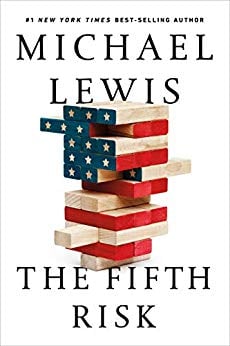A Different Take on the Government
Michael Lewis, author of Liar’s Poker, The Big Short, and Moneyball, delves into the workings of government bureaucracy in his new book, The Fifth Risk. Lewis manages to remove political ideology from his narrative, instead focusing on the work performed by civil servants within the Department of Commerce (DOC), Department of Energy (DOE), NASA, and other government institutions. I will readily admit that I’m unconvinced about the importance of the government, though Lewis manages to persuade even his most skeptical readers of the value we derive from government investments and programs. Here’s my The Fifth Risk book review.
Roughly seventy percent of the US government’s employees are in some way responsible for the safety and security of the American people. Lewis hones in on the DOE’s job of maintaining and protecting our nuclear weapons. Moreover, the DOE works to prevent terrorists from developing their own nuclear arsenals. Lewis suggests that it’s of critical importance to properly understand, staff, and manage these government projects, otherwise we increase the likelihood of large scale disasters. The titular risk Lewis wants us to consider to better prevent such disasters is that of project management.
Why the DOE is So Important
United States government investments in nuclear weapons during the Cold War enabled our country to amass an inventory of thousands of nuclear warheads. This nuclear stockpile, though, came at a price. Two-thirds of the plutonium used in the United States’ nuclear weapons was created at the Hanford Nuclear Site in Washington State. With Cold War tensions cooling, the government allowed the reactors to cool as well. Though the war has ended and the reactors have been decommissioned, it will take Hanford at least “a century and a hundred billion dollars” to clear away the nuclear waste.
Nuclear cleanup projects like the one in Hanford only account for some of the DOE’s portfolio of responsibilities. Lewis interviewed Tarak Shah, the former Chief of Staff to the Under Secretary for Science and Energy at the Department of Energy, about a terrorist attack carried out against our energy grid.
“Late one night, just southeast of San Jose, at Pacific Gas and Electric’s Metcalf substation, a well-informed sniper, using a .30-caliber rifle, had taken out seventeen transformers. Someone had also cut the cables that enabled communication to and from the substation… ‘We actually don’t have a transformer reserve… Our electric-grid assets are growing vulnerable.'” (66)
Forty percent of our hydroelectric power comes from the grid mentioned above. Investments in its continued protection are incredibly important as we grow increasingly reliant on electrical power.
Dismantling Our Core Institutions
In examining the operations of various government departments, Lewis shows his readers that many civil servants have gone unrecognized while protecting us from the threats of natural and man-made disasters. They’ve funded technological developments that have served as the backbones of many of our biggest industries. How about the weather reports we take for granted (and sometimes ignore?) These are the results of sustained government research projects and investments in improved technology. Lewis makes it clear that the criticism and outright effort to privatize much of the government is a recipe for devastating consequences.
Barry Myers is the CEO of AccuWeather, a company that packages up the government’s weather reports and sells them for profit. The presidential administration picked Myers to run the National Oceanic and Atmospheric Administration (NOAA). Lewis warns that Myers has a financial incentive to prevent the government’s distribution of weather information. Only paying customers of AccuWeather will receive weather forecasts or warnings. This withholding of information will cost lives, especially as catastrophic weather events are a more common occurrence.
I recommend The Fifth Risk to government supporters and skeptics alike. Lewis, known for unravelling difficult subject matter and eloquently explaining it, offers a convincing argument for the continued funding of our government and its many projects. Whether you agree or disagree about this The Fifth Risk book review, please share your opinion in the comment section, or contact me directly.



